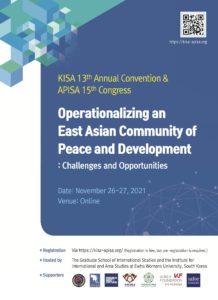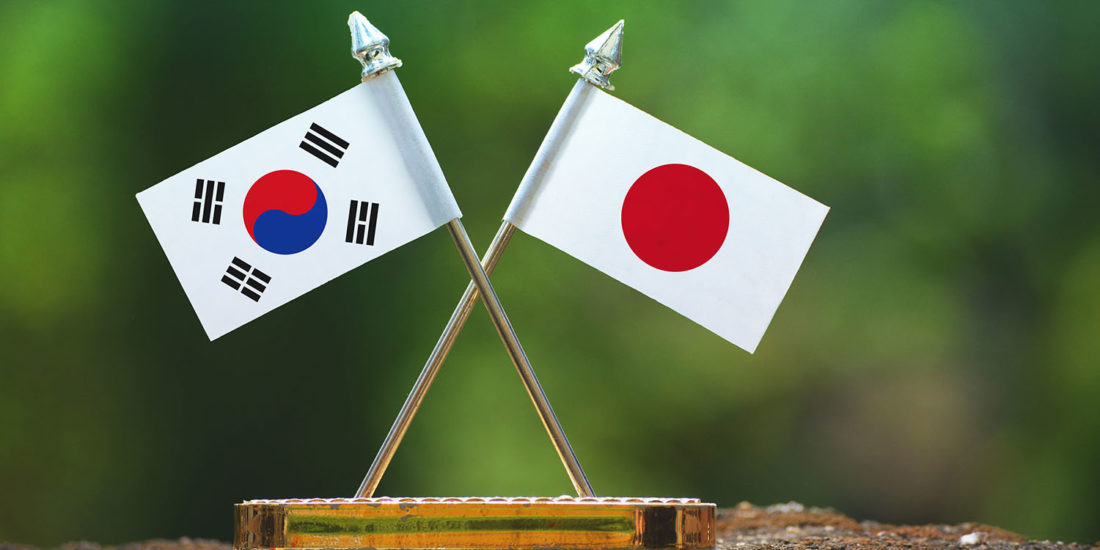Operationalizing an East Asian Community of Peace and Development: Challenges and Opportunities


Report by Haruko Satoh, Co-Director of the IAFOR Research Centre at the Osaka School of International Public Policy (OSIPP), Osaka University, Japan.
The IAFOR Research Centre (IRC) at the Osaka School of International Public Policy (OSIPP) took part as co-organisers in a successful joint annual conference between the Korean International Studies Association (KISA) and the Asian Political and International Studies Association (APISA) on November 26-27, 2021. The conference was hosted by the Graduate School of International Studies, Ewha Womans University and held online with The International Academic Forum providing the operational support. This was the second time that the IRC joined forces with KISA and APISA as part of the IRC’s international research project supported by the Korea Foundation, “Peace and Security in Asia: Toward a Meaningful Japan-Korea Partnership.”
What marked this year’s conference were the quality of keynotes that dovetailed around the forward-looking theme of “Operationalizing the East Asian Community.” The first keynote speech was delivered on November 26 , by Dr Lam Peng Er of the East Asian Institute, National University of Singapore. Addressing the conference a few days before the opening ceremony of the ground-breaking Korea Centre at his institute, he took the audience through a journey of history about the idea of the East Asian community (EAC), tracing its oft-forgotten origins, and the twists and turns that it took in the changing geopolitical landscape and drivers since the 1980s. While he began by characterising the EAC like chasing a ghost, he argued that the triangular cooperation between ASEAN, Japan and South Korea is an important core to any successful attempt to catch this ghost and transform it to reality.
The second keynote session on November 27 was blessed with a high-profile pair of former Foreign Ministers from Japan and South Korea, His Excellency Kono Taro and Dr Kang Kyun-wha, who had forged a trusting friendship while the two served their respective governments around the same time. Dr Kang gave a heartfelt introduction to Kono’s keynote speech, which was rich in informative “behind the scenes” anecdotes (including how their shared hope to improve Japan-South Korea relations were dashed by an unexpected turn of events in 2018—namely the Korea Supreme Court ruling on forced labourers during Japanese colonial rule and subsequent trade sanctions that Japan imposed on South Korea) as well as insightful views about the Japanese foreign and security policy choices in this difficult times. Both went beyond their call to take part in the 30 minute Q & A session that could have lasted much longer. Their friendship and vision represented a silver lining to the current state of affairs in the troubled bilateral relationship.
The combined effect of the two keynotes has been to set an optimistic tone and sense of purpose for enhancing international cooperation among the smaller states (compared to the US and China) in the region, particularly between Japan, South Korea and ASEAN member states, in the areas and issues that fall into the humanitarian-development-peace nexus. The IRC’s APISA roundtable on enhancing Japan-Korea cooperation in non-traditional security issues took up this line of inquiry, where the participants explored areas where Japan and Korea could work more with their Southeast Asian counterparts. The IRC is grateful to Dr Brendan Howe, Dean of the Graduate School of International Studies at Ewha Womans University and the President of APISA for giving us the opportunity to host this roundtable, which was effectively the first engaging discussion for the Korea Foundation project. The summary of this roundtable will be available in a forthcoming short report on OpenAsia.

